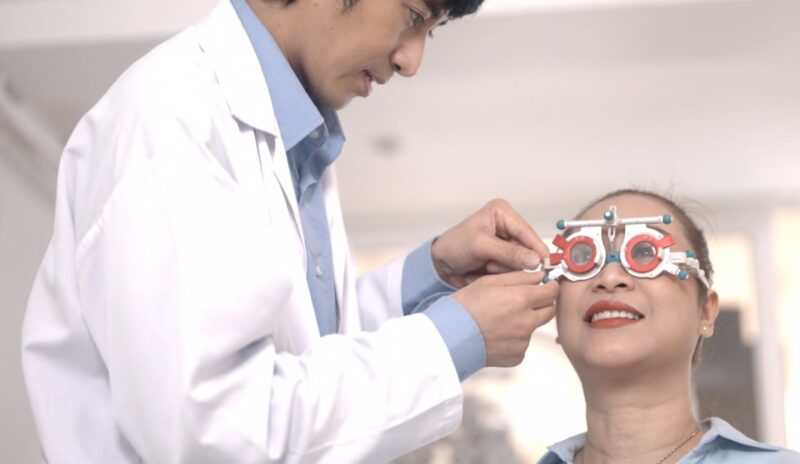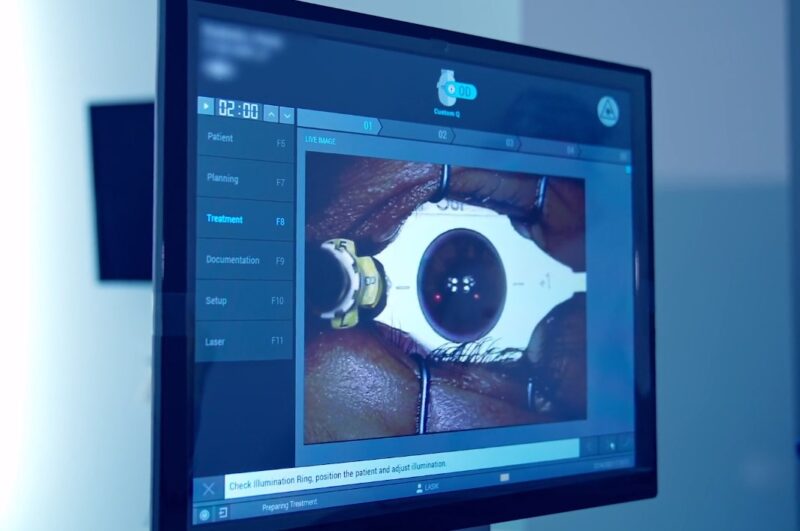If you or a loved one are experiencing blurry or cloudy vision, it could be a sign of cataracts. They are a common eye condition that affects millions of people around the world, particularly those over the age of 60.
While cataracts can be a frustrating and, at times, debilitating condition, the good news is that the surgery for them is a safe, effective, and relatively straightforward procedure.
But when is the right time to undergo cataract surgery? In this comprehensive guide, we’ll take an in-depth look at the various factors that influence the timing of cataract surgery, helping you make an informed decision about your vision and overall eye health.
Cataracts Explained
Cataracts are a natural part of the aging process, caused by the gradual clouding of the lens in the eye. The lens, which is responsible for focusing light onto the retina, loses its transparency and becomes increasingly opaque over time. This results in symptoms such as blurry or hazy vision, difficulty seeing at night, increased glare from bright lights, and fading of colors.
Cataracts can be classified into three main types:
- Nuclear cataracts – These develop in the center of the lens and are the most common form of age-related cataracts.
- Cortical cataracts – These form in the peripheral (outer) part of the lens and gradually extend inward, affecting vision in a spoke-like pattern.
- Posterior subcapsular cataracts – These develop at the back of the lens and can progress rapidly, causing significant vision loss in a relatively short period.
The Early Stages: Monitoring and Management

In the early stages of cataract development, your eye doctor may recommend a “wait and see” approach, as cataracts typically progress slowly. At this point, it’s essential to monitor your vision regularly and report any changes to your eye care professional. You may be able to manage your symptoms with some simple strategies, such as:
- Using brighter lighting in your home or office
- Wearing anti-glare sunglasses outdoors
- Using magnifying lenses for reading or detailed work
- Updating your eyeglass prescription
When to Consider Surgery: Key Indicators
While surgery is an effective treatment option, it’s crucial to determine the right time to undergo the procedure. There is no one-size-fits-all answer to this question, as the timing will depend on various factors, including the severity of your symptoms, your overall health, and your individual needs and lifestyle.
Here are some key indicators that it may be time to consider cataract surgery:
1. Your Vision Is Significantly Impaired
If your cataracts are causing significant vision loss, making it difficult to perform everyday tasks like reading, driving, or recognizing faces, it may be time to consider surgery.
2. Your Quality of Life Is Affected
When cataracts begin to impact your ability to participate in activities you enjoy, such as hobbies or social events, it’s worth discussing surgery with your eye doctor.
3. Your Safety Is Compromised
If your vision has deteriorated to the point where you feel unsafe, especially when driving or navigating stairs, it’s essential to consider surgery to prevent accidents.
4. You Have Other Eye Conditions
If you have additional eye conditions, such as glaucoma or diabetic retinopathy, your eye doctor may recommend cataract surgery sooner to preserve your vision and prevent further complications.
Preparing for the Surgery: Evaluations and Expectations
Once you and your eye doctor have decided that cataract surgery is the best course of action, you’ll undergo a thorough preoperative evaluation to ensure you’re a suitable candidate for the procedure. This assessment may include:
1. A Comprehensive Eye Examination
Your eye doctor will examine your eyes to determine the type and severity of your cataracts, as well as identify any other eye conditions that could affect the surgery’s outcome.
2. Measurements of Your Eyes
Using specialized equipment, your eye doctor will measure the size and shape of your eyes to determine the appropriate intraocular lens (IOL) to replace your clouded natural lens during surgery.
3. Review of Your Medical History
Your overall health will be taken into account, including any medications you’re taking, to ensure there are no contraindications to cataract surgery.
4. Discussion of Expectations
It’s essential to have a clear understanding of what to expect during and after cataract surgery, as well as the potential risks and complications. Your eye doctor will discuss these factors with you to ensure you’re fully informed and comfortable with your decision.
The Surgery Process: What to Expect

Cataract surgery is an outpatient procedure, which means you’ll be able to go home on the same day. The surgery itself is relatively quick, usually taking about 15 to 30 minutes per eye. During the procedure, your eye surgeon will make a small incision in the cornea, remove the clouded lens, and replace it with a clear artificial lens (IOL).
There are two primary methods for cataract surgery:
1. Phacoemulsification
This is the most common method, in which your surgeon uses a high-frequency ultrasound device to break up the cataract into small pieces, which are then gently suctioned out through the incision.
2. Extracapsular Cataract Extraction
In this method, your surgeon makes a larger incision and removes the cataract in one piece. This technique is typically used for more advanced cataracts or when phacoemulsification isn’t a suitable option.
Following surgery, you’ll be given postoperative instructions to care for your eye as it heals. You may experience mild discomfort, itching, or blurry vision for a few days, but these symptoms should subside as your eye adjusts to the new lens.
The Road to Recovery: Postoperative Care and Follow-up

Proper postoperative care is crucial for ensuring the success of your cataract surgery and minimizing the risk of complications. Your eye doctor will provide you with detailed instructions for caring for your eye, which may include:
- Using prescribed eye drops to prevent infection and inflammation
- Wearing an eye shield or protective glasses, particularly while sleeping or during activities where your eye could be at risk
- Avoiding heavy lifting, bending, or strenuous exercise for a short period
- Refraining from swimming or using hot tubs for several weeks
You’ll have a series of follow-up appointments with your eye doctor to monitor your progress and ensure your eye is healing properly. Most people notice a significant improvement in their vision within a few days to a few weeks after cataract surgery, although it can take up to three months for your vision to fully stabilize.
Final Words
Deciding when to get cataract surgery is a personal decision that should be based on a careful assessment of your symptoms, overall health, and the impact of cataracts on your quality of life. By working closely with your eye care professional and considering the factors outlined in this guide, you can determine the optimal time to undergo surgery and reclaim the clear vision you deserve. Remember, timing is everything – and when it comes to surgery, making the right decision at the right time can make all the difference in the world.





